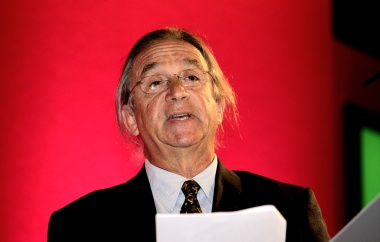A nuclear plant as the setting for a new hit TV series? Popular entertainment media could prove to be more effective at engaging public support and acceptance for nuclear energy than past industry attempts to convince the world of nuclear's merits.
In a special presentation to the World Nuclear Association's 34th Annual Symposium, Belgian publisher and former nuclear engineer Alain Michel exhorted the nuclear industry to make more efforts to engage public support on an emotional level - and popular entertainment media would be the perfect platform to achieve this.
 |
| "When we are involved in heated debate, we try to remain cool and avoid showing emotion… Unluckily, the results are not up to our expectations." (Image: Andy Barker) |
Having spent over 40 years of his career working for Belgonucleaire in roles ranging from plutonium fuel design and testing to media and public relations, Michel is well versed in the tactics and arguments used both by the supporters and opponents of nuclear power. However, he suggests that the nuclear industry might have missed a trick by taking a rational, rather than emotive, approach to communications. "We thought - or had been told - that offering technical or scientific facts would convince if presented rationally. So even when we are involved in heated debate, we try to remain cool and avoid showing emotion… Unluckily, the results are not up to our expectations," he says.
Emotion should not be neglected - it has an even stronger influence on our memories than do cold facts. "It is the general atmosphere that is remembered, not the details," he notes. Central to Michel's argument is the challenge to change the technocratic image of players in the nuclear industry into ordinary human beings. "Nuclear operators are not the great priests serving a monstrous god. They are men and women with a difficult job that requires knowledge, skills and attention," he says.
After ten years of research on how public opinion of nuclear activities is affected by emotional influences such as television, film or books, Michel is convinced that nuclear communication should be more emotive. Pointing to the success of popular television series on a worldwide scale in raising the profile of certain professions - the CSI franchise and forensic medicine being but one example - Michel suggests that nuclear activities as the backdrop for a television series could simply help nuclear energy to become more familiar to everyone, not just those who happen to live near a nuclear power plant. The role of International Atomic Energy Agency inspectors could be the potential subject for such a series, posits Michel.
However, he warns, the nuclear industry must steer clear of "subsidising" the movies or it will be viewed with suspicion by the viewing public. Instead, he says, the initiative must come from producers or scriptwriters, citing Dan Brown's novel Angels and Demons, in which some of the action takes place in the European Organisation for Nuclear Research's CERN laboratory in Geneva. CERN was keen to participate in the filming this summer's Hollywood blockbuster based on the novel, starring Tom Hanks. Indeed, CERN has taken the opportunity afforded by the film to launch its own website explaining the science behind the plot, while the film's official publicity website itself provides links to "the real CERN".




_47120.jpg)

_23621.jpg)






